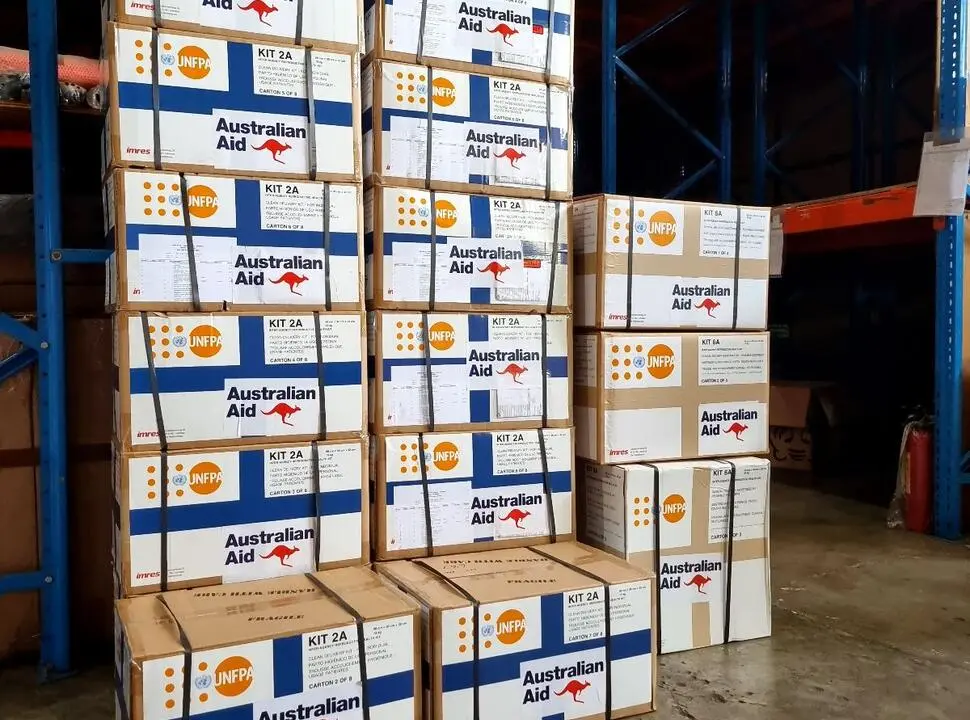Updates
Australia stands up to uplift the lives of women and girls affected by natural disasters
04 Apr 2023
Updates
04 Apr 2023
In response to the deadly earthquakes that struck Türkiye and Syria in early February, the Government of Australia has contributed AUD3.5 million to UNFPA, the United Nations sexual and reproductive health agency, to safeguard the health, well-being and rights of Syrian women and girls. With this financial support, the Department of Foreign Affairs and Trade is supporting UNFPA to deliver maternal and child health and protection services for women and girls who have been displaced from their homes.
In Syria, almost 9 million people have been directly affected by the earthquakes, including an estimated 2.3 million women of reproductive age – 140,000 are currently pregnant. The earthquakes have damaged and destroyed health care facilities and disrupted critical reproductive health services, cutting women’s and girls’ access to antenatal and delivery services and increasing risks of maternal mortality. Thousands of women and girls in earthquake-affected areas are living in overcrowded, makeshift camps or on the streets and are facing high protection risks, including an elevated risk of gender-based violence, exploitation and abuse.
In northwest Syria, where Australia’s funding is being allocated, over 20,000 women and girls have accessed sexual and reproductive health services since the onset of the natural disaster. This includes more than 1,350 women who have been supported to give birth safely, and around 400 C-sections that have been performed, at UNFPA-supported facilities. Over 140,000 women and girls have received essential hygiene items and blankets.
“The generous funding of the Australian government will be instrumental in saving lives and mitigating the plight of Syrian women and girls. The earthquakes that struck have only compounded suffering for the population of a war-torn Syria plagued with 12 years of conflict,” said Himyar Abdul Abdulmoghni, UNFPA Syria Representative. a.i. “Such support from committed donor governments backstops UNFPA’s continued provision of essential life-saving reproductive health services, prevention of gender-based violence, and extension of overall response services across Syria.”
In addition to its support to the earthquake response, the Australian Government is contributing AUD2.5 million to UNFPA’s overall humanitarian response in Syria. “The earthquakes have exacerbated the ongoing humanitarian crisis in Syria, where years of conflict have driven millions from their homes," said Australia Foreign Minister Penny Wong. "With its support to the earthquake response, the Australian Government is contributing AUD6 million to UNFPA’s humanitarian response in Syria, where even before the recent disaster more than 15 million people required humanitarian assistance across the country. Australia has been a long-term supporter of UNFPA in Syria, with funding helping to meet the reproductive and protection needs of women, girls and children.”

Alongside the Government of Australia, UNFPA is committed to a swift and quality humanitarian response to ensure that sexual and reproductive health and protection services for women and girls are maintained during a crisis. Australia is UNFPA’s third largest government contributor to humanitarian aid, providing predictable and flexible humanitarian financing which enables UNFPA to prepare for and respond quickly to disasters and emergencies worldwide.
Recently, Australia also contributed AUD3 million to the Philippines for the next three years to support the provision of life-saving reproductive health and gender-based violence services and supplies in emergencies. The Southeastern Asia country has been hit by several natural disasters in recent years, particularly affecting women and girls.